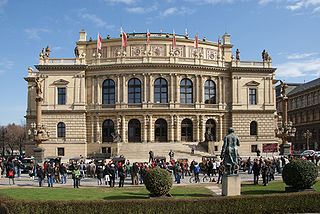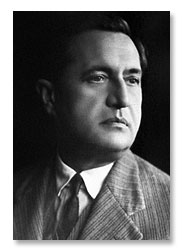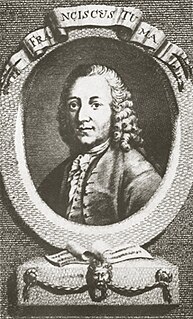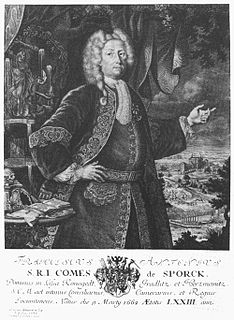František Antonín Míča (also Micza or Mitscha [1] ) (5 September 1694 –15 February 1744, Jaroměřice nad Rokytnou (German : Jarmeritz)) was a Czech conductor and composer.

Jaroměřice nad Rokytnou is a town in the Czech Republic.

German is a West Germanic language that is mainly spoken in Central Europe. It is the most widely spoken and official or co-official language in Germany, Austria, Switzerland, South Tyrol (Italy), the German-speaking Community of Belgium, and Liechtenstein. It is also one of the three official languages of Luxembourg and a co-official language in the Opole Voivodeship in Poland. The languages which are most similar to German are the other members of the West Germanic language branch: Afrikaans, Dutch, English, the Frisian languages, Low German/Low Saxon, Luxembourgish, and Yiddish. There are also strong similarities in vocabulary with Danish, Norwegian and Swedish, although those belong to the North Germanic group. German is the second most widely spoken Germanic language, after English.

Conducting is the art of directing a musical performance, such as an orchestral or choral concert. It has been defined as "the art of directing the simultaneous performance of several players or singers by the use of gesture." The primary duties of the conductor are to interpret the score in a way which reflects the specific indications in that score, set the tempo, ensure correct entries by ensemble members, and "shape" the phrasing where appropriate. Conductors communicate with their musicians primarily through hand gestures, usually with the aid of a baton, and may use other gestures or signals such as eye contact. A conductor usually supplements their direction with verbal instructions to their musicians in rehearsal.
Contents
Míča was born in Třebíč. He conducted many opera performances for royal families. The most paramount example of his work is probably the opera O původu Jaroměřic (About the Origins of Jaroměřice), written in both Italian and Czech. He died at Jarmeritz.

Třebíč is a town in the Moravian part of the Vysočina Region of the Czech Republic. Třebíč is a regional centre with a population of approximately 36,000. It is the administrative capital of the Třebíč District.

Italian is a Romance language of the Indo-European language family. Italian, together with Sardinian, is by most measures the closest language to Vulgar Latin of the Romance languages. Italian is an official language in Italy, Switzerland, San Marino and Vatican City. It has an official minority status in western Istria. It formerly had official status in Albania, Malta, Monaco, Montenegro (Kotor) and Greece, and is generally understood in Corsica and Savoie. It also used to be an official language in the former Italian East Africa and Italian North Africa, where it plays a significant role in various sectors. Italian is also spoken by large expatriate communities in the Americas and Australia. In spite of not existing any Italian community in their respective national territories and of not being spoken at any level, Italian is included de jure, but not de facto, between the recognized minority languages of Bosnia-Herzegovina and Romania. Many speakers of Italian are native bilinguals of both standardized Italian and other regional languages.

Czech, historically also Bohemian, is a West Slavic language of the Czech–Slovak group. Spoken by over 10 million people, it serves as the official language of the Czech Republic. Czech is closely related to Slovak, to the point of mutual intelligibility to a very high degree. Like other Slavic languages, Czech is a fusional language with a rich system of morphology and relatively flexible word order. Its vocabulary has been extensively influenced by Latin and German.
A symphony now believed to be by his nephew František Adam Míča was once attributed to him.
Jan Adam František Míča was a Bohemian composer, jurist, and nephew of the kapellmeister František Václav Míča.












